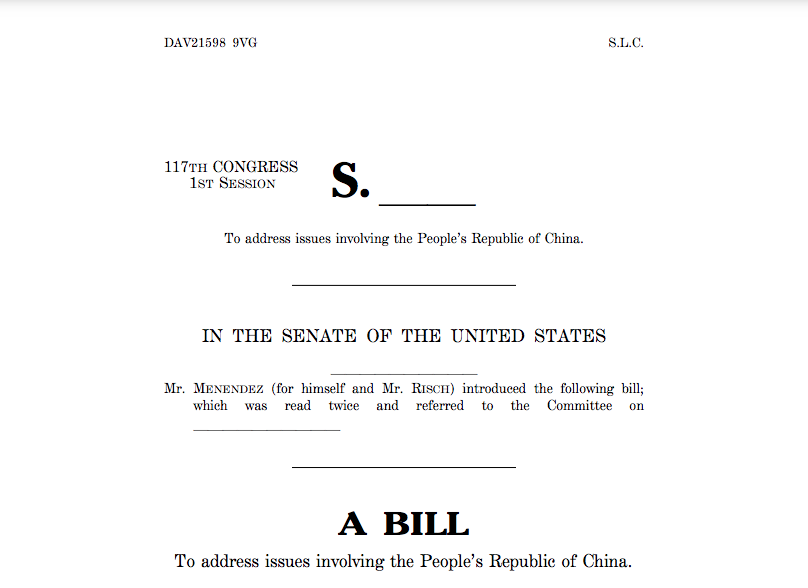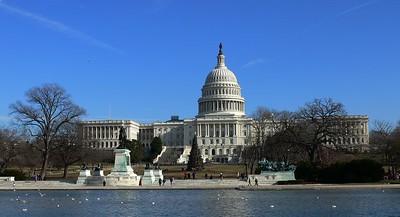Yesterday, on 8 April 2021, Senators Bob Menendez (D-NJ) and Jim Risch (R-ID) announced that they have introduced a draft resolution, entitled the Strategic Competition Act of 2021, addressing a multiplicity of issues regarding the People’s Republic of China. Additionally, Menendez announced that a business meeting will convene next Wednesday, 14 April, for the Senate Foreign Relations Committee to decide whether to formally take up the bill and provide it with its own number.

While the draft bill is a whopping 280 pages, below is an abridged summary of the major components related to human rights and security violations:
- Section 115 – Strategy for Advances and Reliable Energy Infrastructure: The United States government will engage with China’s state-owned and private companies to develop “advanced energy technologies.”
- Section 121 – Sense of Congress on Digital Technology Issues: the United States will combat China’s use of digital technologies and communication technologies to engage in “digital authoritarianism” by conducting surveillance and repressing online freedom and freedom of information.
- Section 135 – Sense of Congress Condemning Anti-Asian Racism and Discrimination: With consideration of the rise in anti-Asian hate crimes and violence following the outbreak of the COVID-19 pandemic in China; and that Asian Americans and Pacific Islanders (AAPI) make up substantial portion of American society, including healthcare and other front-line workers; the United States condemns “the reprehensible attacks on people of Asian descent” and will “use available and appropriate tools to combat the spread of anti-Asian racism and discrimination.”
- Section 136 – Supporting Independent Media and Countering Disinformation: The United States Agency for Global Media (USAGM) will combat disinformation and misinformation campaigns by the Chinese government. To do so, Radio Free Asia – including its Mandarin, Tibetan, Uyghur, and Cantonese language services – will be expanded, and Voice of America will develop a disinformation tracking tool.
- Section 210 – Sense of Congress on Centrality of Sanctions and Other Restrictions to Strategic Competition with China: The United States Congress has authorized sanctions to address the Chinese government’s concerning track record of “intellectual property theft; cyber-related economic espionage; repression of ethnic minorities; other human rights abuses; abuses of the international trading system; illicit assistance to and trade with the Government of North Korea; and drug trafficking, including trafficking of fentanyl and other opioids.”
- Section 212 – Enhancing the United States-Taiwan Partnership: The United States, per the Taiwan Relations Act, will continue to promote Taiwanese democracy and self-reliance by sending them tools to enhance their defense capabilities. The United States will also encourage Taiwan’s participation in the United Nations, World Health Assembly, and other international coalitions.
- Section 214 – Report on Origins of the COVID-19 Pandemic: The United States, with the view that understanding the origin of the disease is essential in combatting its further spread, stresses the necessity of independent experts’ investigation to how the disease emerged in China.
- Section 234 – Statement of the Policy Regarding Universal Implementation of United Nations Sanctions in North Korea: The United States will continue to pressure the Chinese government to introduce its own sanctions against the DPRK and support pre-existing UN sanctions on the DPRK.
- Section 235 – Limitation on Assistance to Countries Hosting Chinese Military Installations: The United States, with the view that the Belt and Road Initiative serves the secondary purpose to advance China’s own interests at the expense of international security and harmony, will limit financial assistance to any country whose government is hosting installations of China’s People’s Liberation Army.
- Section 252 – Engagement with Civil Society in Latin America and the Caribbean Regarding Accountability, Human Rights, and the Risks of Pervasive Surveillance Technologies: The United States, with the view that the Chinese government is exporting its model of societal oppression and state surveillance to Latin American and Caribbean countries, will support Latin American civil society organizations in promoting freedom of information and of technology as well as support independent journalists.
- Section 301 – Authorization of Appropriations for Promotion of Democracy in Hong Kong: The United States Department of State’s Bureau of Democracy, Human Rights, and Labor, with a pre-approved $10 million FY2022 budget, will promote Hong Kong democracy.
- Section 302 – Imposition of Sanctions Relating to Forced Labor in the Xinjiang Uyghur Autonomous Region: The United States will uphold S.3744 Uyghur Human Rights Policy Act – whereas the government of China is engaging in “(A) torture; (B) cruel, inhuman, or degrading treatment or punishment; (C) prolonged detention without charges and trial; (D) causing the disappearance of persons by the abduction and clandestine detention of those persons; (F) other flagrant denial of the right to life, liberty, or the security of persons” against Uyghurs and other ethnic minorities Xinjiang – with the addition of a clause on “(E) serious human rights abuses in connection with forced labor.”
- Section 303 – Imposition of Sanctions with Respect to Systematic Rape, Coercive Abortion, Forced Sterilization, or Involuntary Contraceptive Implantation in the Xinjiang Uyghur Autonomous Region: Pursuant to the above section, the United States will also add the clause on “systematic rape, coercive abortion, forced sterilization, or involuntary contraceptive policies and practices.”
Upon the publication of the draft bill, Senator Menendez stated the following:
“The United States government must be clear-eyed and sober about Beijing’s intentions and actions, and calibrate our policy and strategy accordingly. I am confident that this effort has the necessary support to be overwhelmingly approved by the Senate Foreign Relations Committee next week and the full Senate shortly thereafter. That is the only way we will get the China challenge right – a bipartisan commitment to mutual trust and good-faith compromise, balancing pragmatism and idealism, and a shared dedication to finally solving one of the toughest challenges our nation faces.”
In response to the introduction of the draft legislation, Chinese Foreign Ministry Spokesperson Zhao Lijian stated the following at an April 9 press conference:
“China is firmly opposed to the bill introduced by relevant members of Congress [read: Senate Foreign Relations Committee]. Our position on China-US relations and issues relating to trade, Xinjiang, Hong Kong and Taiwan are clear and consistent. I reiterate that China is committed to developing a relationship with the US featuring non-conflict, non-confrontation, mutual respect and win-win cooperation. At the same time we will continue to firmly safeguard national sovereignty, security and development interests. Relevant individuals on the US side should view China and China-US relations in an objective and rational light and stop pushing the negative bill concerning China.”
Cover image by Aleksey Maksimov on Flickr (CC BY-NC-ND 2.0)

